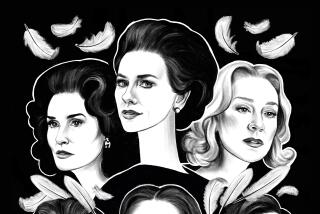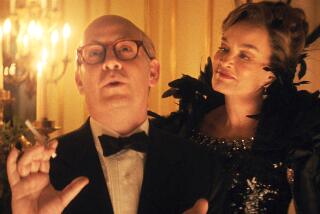The ‘Tru’ Story : Robert Morse Tells How He Staged a Comeback
Robert Morse received a veritable trunkload of praise from the critics and numerous awards--including the prestigious Tony. Yet the actor still can’t explain his performance as the late author Truman Capote in Jay Presson Allen’s one-man play, “Tru.”
PBS’ “American Playhouse” series brings “Tru” to the small screen Monday in a performance taped last year at Chicago’s Shubert Theatre. “Tru” is set on Christmas Eve and Christmas Day, 1975, soon after Capote’s friends turned on him when he revealed their secrets in a chapter from his book, “Unanswered Prayers,” that was excerpted in Esquire magazine.
In a recent interview, Morse, 61, said when he read “Tru” he felt he knew the controversial author of “In Cold Blood” and “Breakfast at Tiffany’s.”
“I could do his voice,” Morse said, breaking into his uncanny Capote. “I could just feel it. People ask me, ‘Did you study? Did you read his books? Did you get copies of the old Jack Paar show?”
Morse shook his head. “I will say I got one copy of ‘The Dick Cavett Show’ and he had a whole interview (with Capote),” he said. “I watched it and put it away. I knew it wasn’t going to help me any more. I had to blend Robert Morse into this character. (I wanted) a fusion of the two people.”
The Capote makeup, designed by Kevin Haney, made the fusion complete. “They gave me a beautiful wig with balding hair and a false tooth,” Morse said. The makeup was so light, Morse often forgot he was wearing it. “It is foam,” he said. “It moves with you and breathes. I never knew what I looked like.”
Morse said he strived not to do an impersonation of the flamboyant Capote. “No way did I want it to be some swivel-hipped fop,” Morse said. “This was going to come from all my pains and aches. Sexuality and sensuality had nothing to do with it. This was the way the man spoke and talked and acted.”
Though he fell in love with “Tru” as soon as he read it, Morse was filled with self-doubts about the project. “I called my agent and said, ‘This is something I am scared to death to do.’ ”
That weekend he met and auditioned for Allen. When she told him he had the part, Morse asked what the plans were for the play. Perhaps off-Broadway, she told him. But first, it would open in eight weeks at Vassar College.
Morse couldn’t believe his ears. ‘I took a long pause,” Morse said. “I went, ‘Eight weeks? Why didn’t you come to me a little sooner? I have to go home and learn it in four weeks and then travel by plane and that is going to take three or four days. I will be honest with you, this is frightening.’ ”
Allen told him if he wanted the part he had to know the lines in four weeks.
When Morse returned home, he had a panic attack. “I pulled the shades,” he said. “I was absolutely petrified. I felt I could never learn it. I would forget it and would be booed out of town and be in a hospital bed. I had all of these feelings, but I know feelings are not facts. So I had just to go through his panic.”
For the next four weeks, Morse “obsessed” over the script. By the time the curtain went up on the first preview at Vassar, Morse was “tired, bleary-eyed like a child. It was a slow evening and at the end of it people stood up and clapped. I slowly began to realize I didn’t have to worry about what the next line was. I could get it into my system and start doing it.”
Word-of-mouth was strong and by the end of the run, the Shuberts of Broadway fame decided to bring the show to New York and open it at the Booth Theater.
Returning to Broadway was a dream come true to Morse, who had been one of the Great White Way’s brightest musical lights in the ‘50s, ‘60s and early ‘70s, starring in “Take Me Along,” “Sugar” and “How to Succeed in Business Without Really Trying,” for which he won his first Tony.
Morse also appeared in the film version of “How to Succeed,” as well as the cult film “The Loved One” and “Guide for the Married Man.” But Morse began drinking in the ‘60s--he’s been sober since 1975--and his behavior suffered. His 1968 TV series “That’s Life” failed, as did his film “The Boatniks” and his last Broadway musical, “So Long, 174th Street.”
Until “Tru,” Morse supported his family (he has three daughters from a marriage that ended in 1981) by doing musicals around the country and TV guest shots. He was living in a one-bedroom apartment on Stanley Avenue in West Hollywood when “Tru” came into his life.
“This was going to be a comeback or a coming back or a return to the scene of the crime,” More said. “I was going back to New York and walk down 45th Street and see all the old stage hands and be working on Broadway.”
Morse, who is now remarried, is grateful and humbled by success the second time around. “I am happy,” he said, with a smile. “Now I have a 17-month-old little girl, and a house that ‘Tru’ built. I am going out on tour (in ‘Tru’) in January and plan to maybe do ‘Showboat’ next September for (director) Hal Prince in Toronto. Something my parents did must have worked out all right.”
“ Tru” airs on “American Playhouse “ Monday at 9 p.m. on KCET and KPBS and repeats Friday at 11 p.m. on KCET and Saturday at 11 p.m. on KPBS.
More to Read
The complete guide to home viewing
Get Screen Gab for everything about the TV shows and streaming movies everyone’s talking about.
You may occasionally receive promotional content from the Los Angeles Times.







